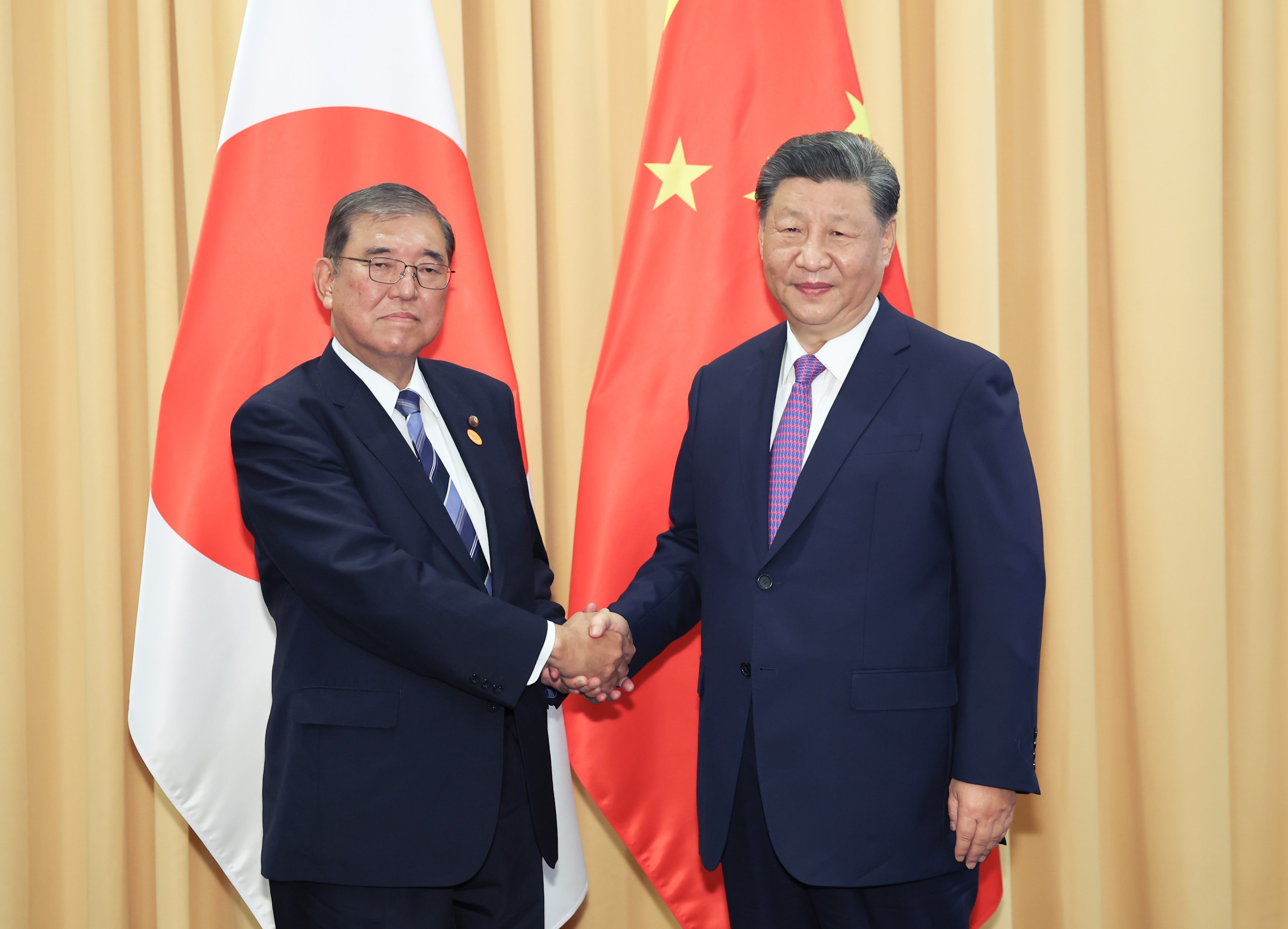Chinese President Xi Jinping meets with Japanese Prime Minister Shigeru Ishiba on the sidelines of the 31st APEC Economic Leaders' Meeting in Lima, Peru, Nov. 15, 2024. [Photo by Huang Jingwen/Xinhua]
LIMA, Nov. 16 (Xinhua) -- China-Japan relations are in a critical period of improvement and development, as the current international and regional situations face changes and turbulence, said Chinese President Xi Jinping on Friday.
As close neighbors and important countries in Asia and the world, the relationship between China and Japan holds significance that goes beyond the bilateral scope, Xi said while meeting Japanese Prime Minister Shigeru Ishiba on the sidelines of the 31st APEC Economic Leaders' Meeting.
He noted that China is willing to work with Japan, in accordance with the principles and directions established in the four political documents between China and Japan, to uphold the important consensus that the two countries should "be partners, not threats," comprehensively advance the strategic relationship of mutual benefit, and endeavor to build a constructive and stable China-Japan relationship that meets the requirements of the new era.
Xi stressed that China's development is an opportunity for the world, and this is especially true for neighboring countries like Japan. He expressed hope that Japan will work with China to develop a correct mutual understanding, steer the bilateral relationship in the right direction from a strategic perspective and with a broad view of the overall situation, and translate the important political consensus reached by both sides into concrete policies and actions.
Xi called on the Japanese side to face history squarely, look to the future, and properly handle major issues of principle such as history and Taiwan, manage differences in a constructive manner and maintain the political foundation of bilateral relations.
Both sides should deepen and expand cultural and local exchanges, promoting mutual understanding between the people of the two countries, especially the younger generation, said Xi.
As China's and Japan's economic interests and production and supply chains are deeply integrated, both sides should adhere to mutual benefit and win-win cooperation, safeguard the global free trade system as well as stable and smooth production and supply chains, said Xi.
He also called on the two countries to strengthen coordination on international and regional affairs, practice true multilateralism, promote open regionalism, and jointly address global challenges.
For his part, Ishiba said that Japan and China are responsible for regional peace and prosperity and it holds great significance to the region and the world that the two sides work together to comprehensively advance the strategic relationship of mutual benefit between the two sides and build constructive and stable bilateral ties.
Japan's position on the Taiwan question, based on the Japan-China joint communique in 1972, remains unchanged, he said, adding that the Japanese side remains committed to the principles and consensus established in the four political documents between Japan and China, and adheres to the path of peaceful development.
The Japanese side is willing to engage in candid dialogue with China at all levels in the spirit of facing history squarely and looking to the future to enhance mutual understanding and trust, he added.
Japan-China economic cooperation holds immense potential and Japan has no intention of decoupling from China, Ishiba noted.
Japan hopes to strengthen people-to-people and cultural exchanges between the two sides and promote cooperation in various areas, including trade, green development, as well as medical and healthcare, to achieve more tangible results that will better benefit the two peoples, he said. Japan is willing to work closely with China within frameworks such as APEC, he added.
The two sides agreed to maintain high-level exchanges, make good use of high-level dialogue mechanisms in the fields of economy, people-to-people and cultural exchanges and other fields, and translate the consensus reached on the discharge of nuclear-contaminated water from Fukushima into action as soon as possible.

 中文
中文




